Do Traders Have Anything to Gain From Shorter IV Ranking Periods?

Do Traders Have Anything to Gain From Shorter IV Ranking Periods?
By:Kai Zeng
The strategy introduces volatility that creates opportunity—but not necessarily better outcomes
Implied volatility rank (IVR) serves as a crucial metric for traders who rely on options to speculate on stock movements. By quantifying a stock's current implied volatility against its historical range, typically over the past year, IVR provides insight into the pricing of options. For example, a high IVR for Apple (AAPL) indicates its options are relatively expensive compared to their historical levels, which could inform a trader’s decision on whether to sell options to collect premiums or wait for a more opportune moment.

The period over which IVR is calculated can significantly influence the metric's utility. While it's common to use a one-year lookback period, traders often experiment with shorter intervals, such as six months or one month, to assess their impact on trading performance. For instance, Amazon (AMZN) might show a different IVR on a six-month timeframe than on a one-year timeframe, potentially affecting the strategies used by options traders.
.jpg?format=pjpg&auto=webp&quality=50&width=1000&disable=upscale)
Shorter lookback periods can lead to higher IVRs, but this is not a hard and fast rule. It's important to note that while a shorter lookback period may increase the IVR on paper, it also adds volatility to the metric itself. This volatility can be double-edged; it may create more frequent trading opportunities, but it doesn't necessarily lead to better trading outcomes.
.jpg?format=pjpg&auto=webp&quality=50&width=1000&disable=upscale)
An analysis of S&P 500 ETF Trust (SPY) 20 delta Strangles over a decade-long period revealed that while the number of trades could increase with shorter lookback periods, the overall performance of the trading strategy remained consistent. This suggests that traders might engage in more transactions without necessarily improving their win rate or profitability.
.jpg?format=pjpg&auto=webp&quality=50&width=1000&disable=upscale)
These findings are instructive for traders across various popular stocks, such as Tesla (TSLA) or maybe Microsoft (MSFT), who might consider adjusting their IVR lookback period to identify more trading setups. However, the analysis underscores that an increased number of trades does not equate with enhanced performance.
In conclusion, modifying the IVR lookback period can indeed affect the level of this metric and potentially lead to a higher frequency of trades. However, traders should weigh the benefits of increased opportunities against the consistent performance of their strategies.
Ultimately, the key takeaway for trading options is that while adjusting the lookback period can offer more entry points, it does not inherently improve the odds of success. Therefore, traders should focus on developing robust strategies that perform well over time instead of excessively tweaking the parameters in search of a performance edge that may not exist.
Kai Zeng, director of the research team and head of Chinese content at tastylive, has 20 years of experience in markets and derivatives trading. He cohosts several live shows, including From Theory to Practice and Building Blocks. @kai_zeng1
For live daily programming, market news and commentary, visit tastylive or the YouTube channels tastylive (for options traders), and tastyliveTrending for stocks, futures, forex & macro.
Trade with a better broker, open a tastytrade account today. tastylive, Inc. and tastytrade, Inc. are separate but affiliated companies.
Options involve risk and are not suitable for all investors. Please read Characteristics and Risks of Standardized Options before deciding to invest in options.
tastylive content is created, produced, and provided solely by tastylive, Inc. (“tastylive”) and is for informational and educational purposes only. It is not, nor is it intended to be, trading or investment advice or a recommendation that any security, futures contract, digital asset, other product, transaction, or investment strategy is suitable for any person. Trading securities, futures products, and digital assets involve risk and may result in a loss greater than the original amount invested. tastylive, through its content, financial programming or otherwise, does not provide investment or financial advice or make investment recommendations. Investment information provided may not be appropriate for all investors and is provided without respect to individual investor financial sophistication, financial situation, investing time horizon or risk tolerance. tastylive is not in the business of transacting securities trades, nor does it direct client commodity accounts or give commodity trading advice tailored to any particular client’s situation or investment objectives. Supporting documentation for any claims (including claims made on behalf of options programs), comparisons, statistics, or other technical data, if applicable, will be supplied upon request. tastylive is not a licensed financial adviser, registered investment adviser, or a registered broker-dealer. Options, futures, and futures options are not suitable for all investors. Prior to trading securities, options, futures, or futures options, please read the applicable risk disclosures, including, but not limited to, the Characteristics and Risks of Standardized Options Disclosure and the Futures and Exchange-Traded Options Risk Disclosure found on tastytrade.com/disclosures.
tastytrade, Inc. ("tastytrade”) is a registered broker-dealer and member of FINRA, NFA, and SIPC. tastytrade was previously known as tastyworks, Inc. (“tastyworks”). tastytrade offers self-directed brokerage accounts to its customers. tastytrade does not give financial or trading advice, nor does it make investment recommendations. You alone are responsible for making your investment and trading decisions and for evaluating the merits and risks associated with the use of tastytrade’s systems, services or products. tastytrade is a wholly-owned subsidiary of tastylive, Inc.
tastytrade has entered into a Marketing Agreement with tastylive (“Marketing Agent”) whereby tastytrade pays compensation to Marketing Agent to recommend tastytrade’s brokerage services. The existence of this Marketing Agreement should not be deemed as an endorsement or recommendation of Marketing Agent by tastytrade. tastytrade and Marketing Agent are separate entities with their own products and services. tastylive is the parent company of tastytrade.
tastyfx, LLC (“tastyfx”) is a Commodity Futures Trading Commission (“CFTC”) registered Retail Foreign Exchange Dealer (RFED) and Introducing Broker (IB) and Forex Dealer Member (FDM) of the National Futures Association (“NFA”) (NFA ID 0509630). Leveraged trading in foreign currency or off-exchange products on margin carries significant risk and may not be suitable for all investors. We advise you to carefully consider whether trading is appropriate for you based on your personal circumstances as you may lose more than you invest.
tastycrypto is provided solely by tasty Software Solutions, LLC. tasty Software Solutions, LLC is a separate but affiliate company of tastylive, Inc. Neither tastylive nor any of its affiliates are responsible for the products or services provided by tasty Software Solutions, LLC. Cryptocurrency trading is not suitable for all investors due to the number of risks involved. The value of any cryptocurrency, including digital assets pegged to fiat currency, commodities, or any other asset, may go to zero.
© copyright 2013 - 2025 tastylive, Inc. All Rights Reserved. Applicable portions of the Terms of Use on tastylive.com apply. Reproduction, adaptation, distribution, public display, exhibition for profit, or storage in any electronic storage media in whole or in part is prohibited under penalty of law, provided that you may download tastylive’s podcasts as necessary to view for personal use. tastylive was previously known as tastytrade, Inc. tastylive is a trademark/servicemark owned by tastylive, Inc.